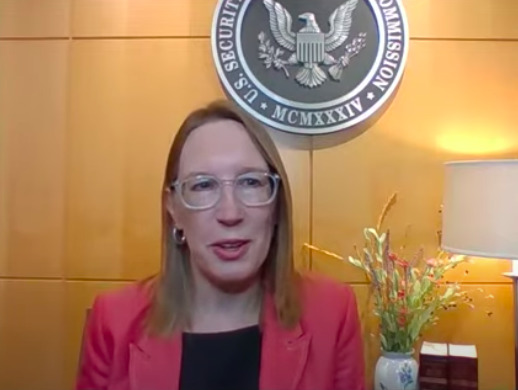Crypto’s fight for liberty: Who’s saying what about the controversial US infrastructure bill

Picture: Getty Images
The highly contentious US bipartisan infrastructure bill is creating fears that crippling tax regulations could have huge ramifications for the American crypto industry.
Ahead of a weekend US Senate vote on the matter, a fight to amend the bill has been taking place. And the topic is heating up – from American corridors of power, to the living rooms (or basements) of the “shadowy super coders” some politicians seem in a tizz about.
The bill, in a largish nutshell
• Among many other things (it’s more than 2,700 pages long), the US Senate’s US$1 trillion bipartisan infrastructure bill calls for increased cryptocurrency tax reporting to boost revenue.
• The section related to crypto taxation was reportedly a last-minute addition drafted by Republican Senator Rob Portman. The heightened regulations could bring in an estimated US$28 billion to the US government over the next decade, according to the Joint Committee on Taxation.
• The new crypto-tax guidelines may affect investors and companies that qualify as “brokers”. This definition is being hotly debated and criticised by many, including industry figures and other senators, as being too broad.
• It’s feared that, if the bill is passed in Congress in its original state, or something close to it, then it could be very damaging for the crypto industry in the US, with stifling implications for Proof-of-Stake protocols and DeFi operators.
• The Senate plans to vote on the bipartisan infrastructure bill on Saturday.
Senators get ready to rumble
There’s been a crypto-amendment heavyweight title fight taking place between two tribes of senators in the lead-up to the weekend’s vote.
In the … not sure what even colour to call it… corner:
Pat Toomey (Republican), Ron Wyden (Democrat) and Cynthia Lummis (Republican). On Wednesday this week, these three senators put forward their crypto-friendly version of the crypto-tax amendment.
It’s an amendment that excludes miners, stakers (anyone using Proof of Stake protocols to earn yield) and software developers. And it’s the one the crypto industry is “rooting for”, as the Americans like to say.
We NEED you. Pls call your Senators. Pls tweet. Pls email. We are facing major headwinds on the Wyden-Lummis-Toomey amendment. Burying financial innovation in red tape & sending devs + miners on info collection wild goose chases for info they don’t know is horrible policy. https://t.co/7GRNIUkpKs
— Cynthia Lummis 🦬 (@CynthiaMLummis) August 6, 2021
And in the crypto-punching corner…
Shadow boxing for the Boomer crowd on the other side of the ring, are Republican Senator Portman and Democratic Senators Mark Warner and Kyrsten Sinema.
We’ll no doubt hear from Democratic Senator Elizabeth Warren at some point, too. Unless she’s stocked up on popcorn and is taking the weekend off from hating crypto.
The trio of senators pushing the bill have since come up with their own somewhat concessional amendment to the amendment, but, by all reports, it doesn’t alleviate matters for the crypto industry very much at all.
In fact, according to a CNBC article, some believe the triumvirate’s further amendment could even create a broader definition of “crypto broker”, and subject even more in the crypto industry to higher taxes and headache-inducing levels of reporting.
White House view: just Biden time before payday?
Scoop: Treasury Secretary Janet Yellen has been privately lobbying lawmakers against Wyden-Lummis-Toomey crypto amendment, as WH seeks to fend off push to limit new regulatory authorities, per sources familiar
W/ @JaxAlemany https://t.co/Jo4It8EUiO
— Jeff Stein (@JStein_WaPo) August 6, 2021
President Joe Biden and friends, for the moment, are ringside with bets on Portman, Warner and Sinema, unfortunately for the crypto crowd.
A White House statement on Thursday read: the “amendment put forward by Senators Warner, Portman, and Sinema strikes the right balance and makes an important step forward in promoting tax compliance.”
“Boooooo,” said crypto in a collective response.
‘Bitcoin fixes this’
Cameron Winklevoss, one half of the Winklevii twins who head up the influential Gemini crypto exchange and custody firm, highlighted a concern from some that the bill itself will only add further to US federal debt.
The infrastructure bill is estimated to add another $256B to the federal budget deficit. It will not be fully paid for. The plunder of future generations continues. #Bitcoin fixes this. https://t.co/dsGsE8UUpf
— Cameron Winklevoss (@cameron) August 5, 2021
As reported by CoinTelegraph, the Winklevii’s tweet comes a week after the US Federal Reserve saw a new record level of debt – topping US$8.24 trillion.
Mike Novogratz, CEO of Galaxy Digital and another prominent crypto billionaire with a big voice was also calling out US regulators this week.
Crypto is the future of our financial system and our citizens deserve officials that do their homework to understand this new technology. Most of our leaders haven’t done that yet. We also need regulators and politicians who understand that new ideas need room to grow. https://t.co/8Fvchigfg5
— Mike Novogratz (@novogratz) August 3, 2021
Charles is getting upset

Cardano (ADA) founder Charles Hoskinson is never one to shy away from an opinion or three on cryptocurrency and American political affairs.
A billionaire in his own right, and a huge proponent of decentralisation and libertarian freedoms, Hoskinson used his YouTube platform to disseminate his views on the crypto-tax amendment battle. Some of the more choice quotes from his 25-minute video include:
“We [the crypto industry] can’t be the convenient place to go and find 28 billion dollars when you want to go and buy things you can’t afford. It’s almost like we’re the uncle who children go and visit because we’re deaf and blind… and then they then go and steal money out of our wallet to buy pot.
“That’s how we’re being treated here – as a piggybank. We created all this wealth, and now the US government wants to go and grab it.”
“Let’s be clear here. If this leviathan of an infrastructure bill is passed, we as an industry go from analogies and trying to figure things out, to negative clarity… where it’s not possible to do the things that are being asked.”
“This is not going to kill our industry, but what it will do is offshore big chunks of the [US] cryptocurrency industry to other countries … But if we lose this battle, it’s going to be a slow, methodical decline and march towards oblivion for the cryptocurrency industry in the United States.”
Decentralisation… this is the way: Crypto Mom

Crypto-friendly SEC Commissioner Hester Peirce, aka “Crypto Mom”, meanwhile, was talking up decentralisation as the only thing that will truly save DeFi projects in the US.
Speaking to crypto channel The Defiant this week, Peirce said:
“If you want to be decentralised, you really need to be decentralised… and that is going to put you in a different category from the perspective of regulators because that’s just not something we’ve dealt with before.
“If regulators can find a centralised part or group of people they can grab hold of, they will grab hold of them. So I think it’s just good to be cautious about how you build things, because down the road, it could have regulatory implications.”
Related Topics
UNLOCK INSIGHTS
Discover the untold stories of emerging ASX stocks.
Daily news and expert analysis, it's free to subscribe.
By proceeding, you confirm you understand that we handle personal information in accordance with our Privacy Policy.








